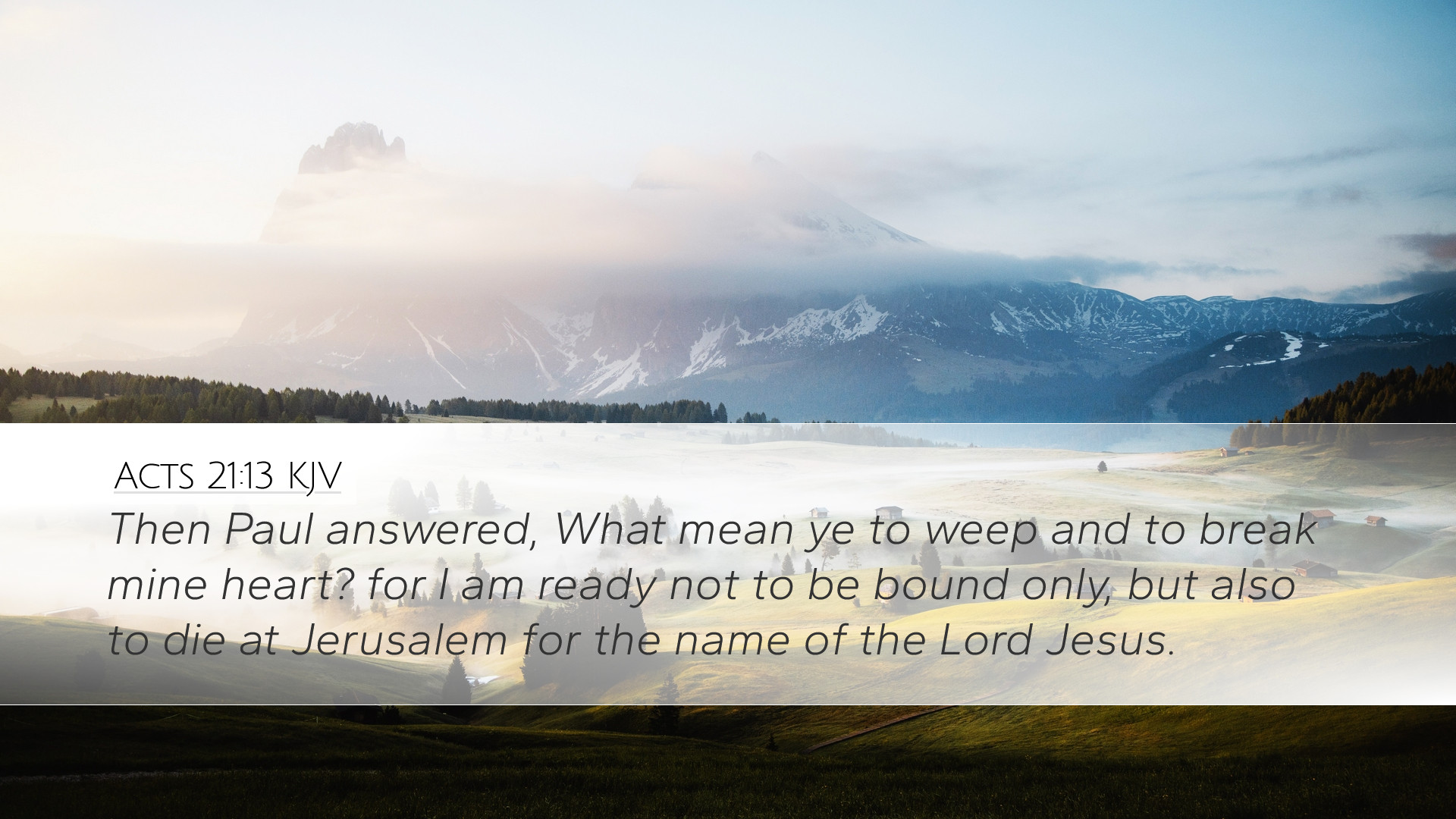Commentary on Acts 21:13
Acts 21:13 states, "Then Paul answered, 'What are you doing, weeping and breaking my heart? For I am ready not only to be imprisoned but even to die in Jerusalem for the name of the Lord Jesus.'
Introduction
This verse encapsulates the intensity of Paul's commitment to his mission and the emotional distress of his companions as they wrestled with the implications of his determination to go to Jerusalem. It serves as a pivotal moment in the narrative of the Acts of the Apostles, illustrating both the personal and communal conflicts faced by early Christians.
Contextual Setting
Before delving into the analysis, it is crucial to understand the context surrounding Acts 21. Paul is on his final journey to Jerusalem, where he knows he will face imprisonment and possible death. Despite warnings from the Holy Spirit and his own companions, Paul persists in his mission. This steadfastness offers a profound lesson in faith and discipleship.
Analysis of the Text
Paul's Resolve
Paul's declaration in Acts 21:13 demonstrates remarkable courage. His readiness to face imprisonment and death reflects his deep-seated conviction in the truth of the Gospel. As Matthew Henry notes, "Paul was willing to suffer for the name of the Lord Jesus; he felt that no suffering could compare with the glory of being a servant of Christ." This highlights the essence of Paul’s apostolic calling, which he embraced with solemnity and devotion.
Emotional Connection with Companions
Paul’s question, "What are you doing, weeping and breaking my heart?" serves as an emotional fulcrum in this narrative. It manifests his acute awareness of the pain his friends are experiencing as they express their fears for his safety. Albert Barnes remarks, "The tears of his friends showed their deep affection and concern, yet Paul’s heart was set on fulfilling the divine mission, regardless of the cost."
The Cost of Discipleship
Paul's readiness to face adversity resonates with Jesus’ own teachings about the cost of discipleship. Adam Clarke emphasizes this connection, stating, "Paul exemplifies the principle that to follow Christ, one must be willing to forsake personal safety and comfort for the sake of the Gospel." This theological reflection invites believers to examine their own readiness to embrace sacrifice in their faith journey.
Theological Reflections
Faithfulness Amidst Trials
The larger theme of faithfulness in trials echoes throughout Scripture. Paul’s unwavering resolve mirrors other biblical figures who faced dire circumstances yet remained steadfast. This invites leaders and learners to cultivate a resilient faith that can withstand challenges—an essential quality for pastors and theologians in contemporary contexts.
The Role of the Holy Spirit
Earlier in Acts, Paul received warnings through the Holy Spirit concerning the troubles waiting for him in Jerusalem. This emphasizes the critical role of the Holy Spirit in guiding and preparing believers for their paths. As Henry suggests, "We must distinguish between the foreknowledge of suffering and the command to avoid it; God often calls us to courage in the face of the unknown."
Community and Individual Commitment
This passage also underscores the importance of community. Paul's companions reveal a collective concern, reflecting the deep bonds within the early church. The tension between individual calling and communal well-being raises pertinent questions for today's church, prompting discussions about how to support those who are called to bear burdens for Christ.
Conclusion
Acts 21:13 presents a powerful narrative of commitment, sacrifice, and communal love. For pastors, students, and theologians, it is a reminder of the weight of discipleship and the strength found in Christ amidst trials. As we reflect on Paul’s example, we are encouraged to pursue our own callings with similar fervor, embracing both the joys and challenges inherent in our faith journeys.
Key Takeaways
- Commitment to Mission: Paul exemplifies unwavering dedication to his divine calling.
- The Emotional Bond: The interplay of love, concern, and mission in Christian partnerships is crucial.
- Cost of Discipleship: Embracing the challenges of faith is essential for spiritual growth.
- Guidance of the Holy Spirit: He plays an essential role in preparing Christians for their journeys.
- Community Support: The early church’s example emphasizes collective responsibility in discipleship.


